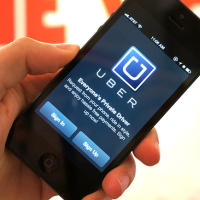L.A. and S.F. Warn “Ride-Sharing” Companies about Actually Sharing Rides

Lyft, the smartphone app-driven “ride-sharing” startup, claims on its website that, “Every driver is screened for criminal offenses and driving incidents. The criminal background check includes national and county-level databases, as well as national sex offender registries.”
Competitors Sidecar and Uber make similar claims. But last week, all three got joint letters from the city attorneys in San Francisco and Los Angeles saying the claims aren’t true and they must remove them from their websites. KQED in San Francisco reprinted the Sidecar letter that characterizes the company as being a “continuing threat to consumers and the public.”
The letters also insist that the companies stop offering real ride sharing. “Ride sharing” generally referred to individuals sharing a common ride, like a shuttle bus, until Uber et al adopted it as part of a self-referential nod to the sharing economy it embodies. Real ride sharing is a regulated transportation activity, which the cities say hasn’t been approved for the new kids on the block.
They ordered the companies to stop offering the shared-ride feature.
Sidecar said that won’t happen.
“We’re going to continue to operate Shared Ride,” Sidecar CEO Sunil Paul told the San Francisco Chronicle. “We think their claims are incorrect and their assertions that we are operating illegally are simply incorrect.”
Although Paul said he found the letter “shocking and baffling,” he got an earful about the ride-sharing complaint from the California Public Utilities Commission (CPUC) in June. The commission said last September, when it issued a framework for regulating the controversial, burgeoning new industry, that they couldn’t provide the service. But the drivers kept popping up at airports, where ride sharing is in demand, so the commission warned the companies they were at risk of losing permission to operate.
The startups, which claim to simply be app developers, not transportation services, have built their innovative and lucrative business model on avoiding taxes and overhead while skirting laws governing the taxi industry and businesses in general.
The taxi industry is in a life-and-death struggle with the startups, which have taken a significant part of their business. A report (pdf) from the San Francisco Municipal Transportation Agency (SFMTA) indicated that taxi drivers there picked up 65% fewer fares in July than in March 2012.
Local and state authorities are still struggling to come up with a comprehensive regulatory framework for ensuring fair rates, insurance, safety, reliability and fairness while not illegally impairing the application of new technology.
The companies have until October 8 to formally respond to the city attorneys.
–Ken Broder
To Learn More:
S.F., L.A. Threaten Uber, Lyft, Sidecar with Legal Action (by Heather Knight and Benny Evangelista, San Francisco Chronicle)
San Francisco District Attorney Threatens Action against Uber, Lyft, Sidecar (by Bryan Goebel and Dan Brekke, KQED)
SF, LA District Attorneys Threaten to Sue Uber, Lyft, and Sidecar (by Cyrus Farivar, Ars Technica)
State Regulators to Review Rules for Uber, Lyft and Sidecar (by Patrick Hoge, San Francisco Business Times)
Lyft Just Slashed Driver Pay Again, and Everyone's Pissed (by Kevin Montgomery, ValleyWag)
- Top Stories
- Controversies
- Where is the Money Going?
- California and the Nation
- Appointments and Resignations
- Unusual News
- Latest News
- California Forbids U.S. Immigration Agents from Pretending to be Police
- California Lawmakers Urged to Strip “Self-Dealing” Tax Board of Its Duties
- Big Oil’s Grip on California
- Santa Cruz Police See Homeland Security Betrayal in Use of Gang Roundup as Cover for Immigration Raid
- Oil Companies Face Deadline to Stop Polluting California Groundwater





